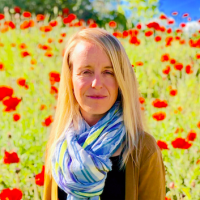View this post on Instagram
*Elephant is not your doctor or hospital. Our lawyers would say “this web site is not designed to, and should not be construed to provide medical advice, professional diagnosis, opinion or treatment to you or any other individual, and is not intended as a substitute for medical or professional care and treatment. Always consult a health professional before trying out new home therapies or changing your diet.” But we can’t afford lawyers, and you knew all that. ~ Ed.
~
On January 26, 2018, while ski instructing, I hit a hidden ramp at high-speed in whiteout conditions on an intermediate ski run I’d skied hundreds of times before. I fell backward, hitting the back of my head before any other part of my body came to rest on the slope. My goggle lens popped out from the force to my head and flew across the slope. My helmet remained intact.
While I knew where I was and who I was, I did not know what day it was or even what the days of the week were called. I had the overwhelming urge to vomit, and then instantly fell asleep at 10,000 feet where it was 10 degrees and blowing 20 mph—I was in trouble.
The typical medical protocol was followed by ski patrol, the ambulance, and the ER. I was sent home within hours once a brain bleed was ruled out. I was told it was a concussion and I would be better in a week.
Fast-forward 13 months, and I am still battling post-concussion syndrome. I’m still going to vision therapy every week for the vision issues I’ve endured from the direct blow to the occipital region. I have not returned to my winter profession as a ski instructor and likely never will.
I only discovered how to heal my body because I did not give up. I refused to nod my head at the medical professionals who insisted that I accept my “new normal” and that my life will be just so-so and hard for the foreseeable future.
Case in point: 11 months after bouncing my head off an icy slope while skiing, I finally saw a neurologist to go over my injury. The neurologist’s prescription for me was to enjoy skiing for three hours per day and to end all forms of rehabilitation. I was to return to all activity; I just needed to be patient, and my life would return to normal—despite persistent symptoms.
Refusing to be patient, and after researching best ways to heal the brain on my own, I have found diet, meditation, and a shift in attitude has proven to help me feel the most normal and alert.
Diet
While I already had a healthy diet, I was not on any particular diet that would heal my brain. According to Gary L. Wenk (who is a Professor of Psychology, Neuroscience, and Molecular Virology, Immunology and Medical Genetics at the Ohio State University and Medical Center), “In the hours, days, and weeks following initial accident, a series of secondary biochemical changes develop that lead to a progressive degeneration within vulnerable brain regions.” First, the mitochondria are damaged. Then, oxidative stress causes brain inflammation. This all leads to sleep disruption, depression, irritability, impulsivity, and fatigue.
I had it all.
To combat these outcomes, eliminating processed foods and eating healthy fat is essential. Also, having an arsenal of supplements to ensure my brain was getting all the essential nutrients it needed was important too. All of this worked for me.
There is evidence that the ketogenic diet can help lessen the symptoms of a mild traumatic brain injury (mTBI). I have experienced many benefits to a modified keto diet including less brain fog, no headaches, better concentration, and better sleep.
Meditation
The medical professionals will likely tell you to be patient. That’s what I was told—but there is a difference between being patient and being mindful. The definition of patience is to be able to accept or tolerate delays, problems, or suffering without becoming annoyed or anxious. Being mindful is to be conscious or aware of something. For me, being patient equaled inaction. Being mindful meant a path forward to a healed outcome. And how I blended the two was through meditation.
It was through meditation that I found radical acceptance. Meditation helped me process the loss.
Radical Acceptance
Radical acceptance is a powerful tool when life shifts in an instant. Doing something radically means to be thorough, profound, complete; and to accept what happened to me in a thorough, profound, and complete manner, I lessened my suffering.
Tara Brach describes radical acceptance as such: “With Buddhist mindfulness training we learn to be aware of what is happening inside us with a clear, non-judging attention. Specific practices to develop compassion cultivate our capacity to hold with kindness painful or intense experiences that are arising within us.”
Awareness has helped me navigate one of the scariest symptoms of a mTBI: not knowing what I do not know. That’s not a typo. When I hit my head, I shook my control center. I shook my ability to think critically. I shook my sense of self, my sense of place, my sense of identity.
I cry as I write this, knowing someone will likely hit his or her head today and won’t get the critical care needed to heal a brain injury well from the start.
I take a deep breath as I eat my avocado mindfully, accepting that, today, I am on the path to healing.
~






Read 13 comments and reply